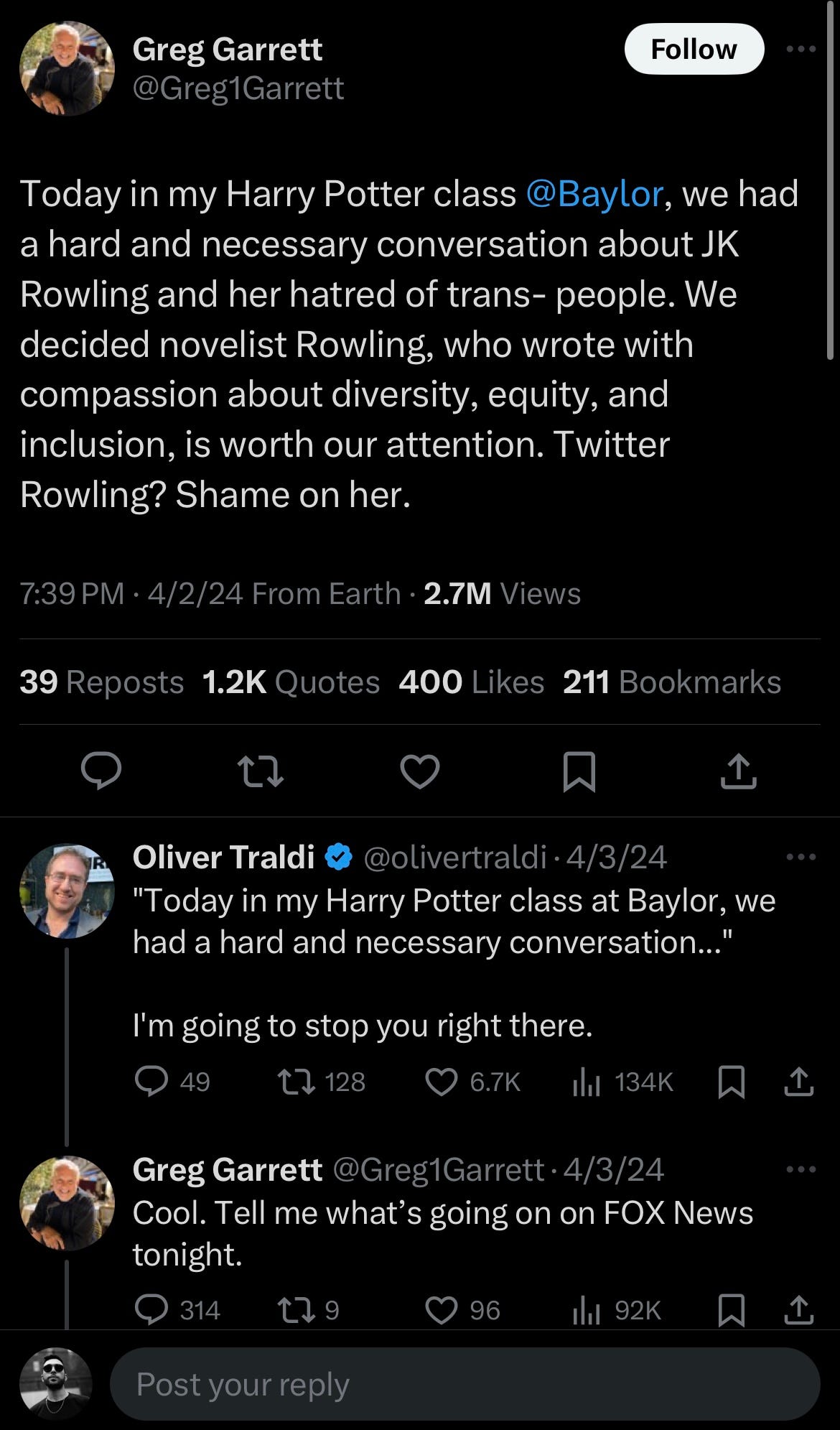So a professor tweeted this
And I was severely triggered.
Many of my students complain to me about these old profs who are out of touch with reality. So I decided to write a little something about why this seems to be to case for
(who published Josef Luciano’s review of the zine reading, and whose editor wrote for us on urban planning), and on why they tell me I’m so based as a prof.The recent fanfare over the Baylor University professor Dr. Greg Garret’s post on X about having “a hard and necessary conversation” with his students “about JK Rowling and her hatred of trans people” is a case in point. His comebacks — if you can even call them that — did not help his case. “Cool,” he shot back at one of his detractors, “tell me what’s going on on FOX News tonight.”
I could not help but — pardon the pun — cringe at his insufferable cringeness. This thread, with over six thousand replies and reposts and 2.6 million views, embodied so much my students complaints about their older, out-of-touch professors who virtue signal in order to “relate to the kids,” prove their moral righteousness, avoid getting canceled, or gratify their cloying need for affirmation.
Numerous students who claim to be based complain about professors who shove poststructuralist theory down their throats as if it were Gospel-truth (rather than one among many other schools of thought). Said professors, in their eyes, are not based precisely because their ideas are not “based” — that is — rooted in reality. They opt instead to push forth their vaporous, liquid-like worldview where race, class, and gender are eliminated, thus enabling us to live in a rootless utopia of peace and harmony.
But even my students who consider themselves to be “woke” are turned off by such cringe professors. To them, these professors’ progressivism is not rooted in an actual concern for the cause of the oppressed or in concrete social activism, but in performance art.
Their complaints echo much of what the controversial feminist professor Camille Paglia told Jordan B. Peterson in their viral conversation about the “real radicals” who she met as a student in the 1960s, who “were not word choppers. They were not snide postmodernists. … They used the language of the people. They had a populist energy. They addressed class. These are people who lived by their own convictions.”
The very existence of college courses about subpar works of literature like Harry Potter is a sign of the greater crisis of higher education. When there is a lack of consensus about what a college education is for and why it is worth student’s while, what else to do than to fill in the void with content inspired by the algorithm: viral pop culture trends and vacuous culture war fodder? Without any basis in reality, that is, in substantial academic content, universities are doomed to sell their empty product to their “consumers” — fewer and fewer of whom are naive enough to drink the Kool Aid.
Professors’ fixation with “right-speak” turns off young people, who — in the words of Pope Francis — have a “nose” for professors who are not “open to reality” and thus are not good professors and are “not even interesting.”
On the contrary, he insists that “school teaches us to understand reality. Going to school means opening one’s mind and heart to reality, in the wealth of its aspects, of its dimensions,” adding that “if one has learned how to learn—this is the secret, to learn how to learn! One retains this always, a person remains open to reality!” Consequently, students “are attracted by professors whose thoughts are open, ‘unfinished’, who are seeking something ‘more’, and thus they infect students with this attitude.”
Continue reading here.
For more on the topic, you should read my piece on why Harry Potter is more cringe (neolib) than satanic—and thus why you shouldn’t be teaching about it in college, and you should read friend of the pod Jordan Castro’s piece on professors’ “right-speak.”




